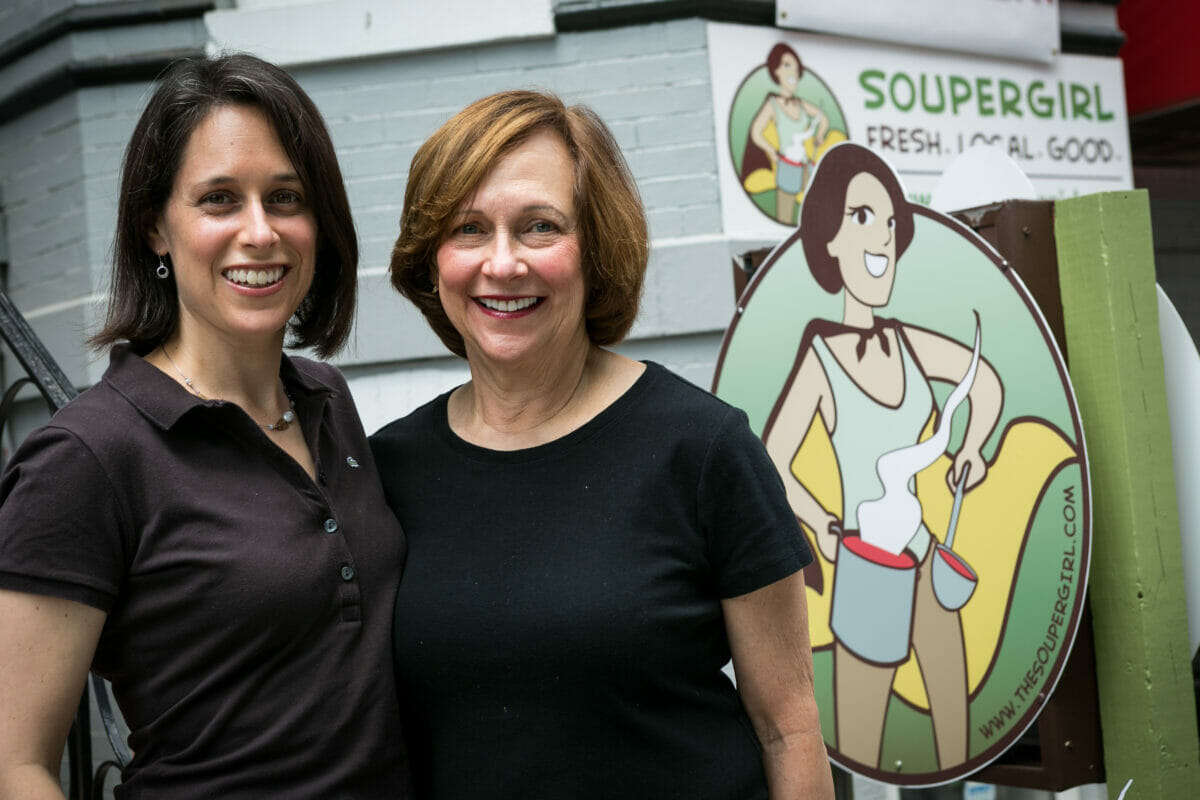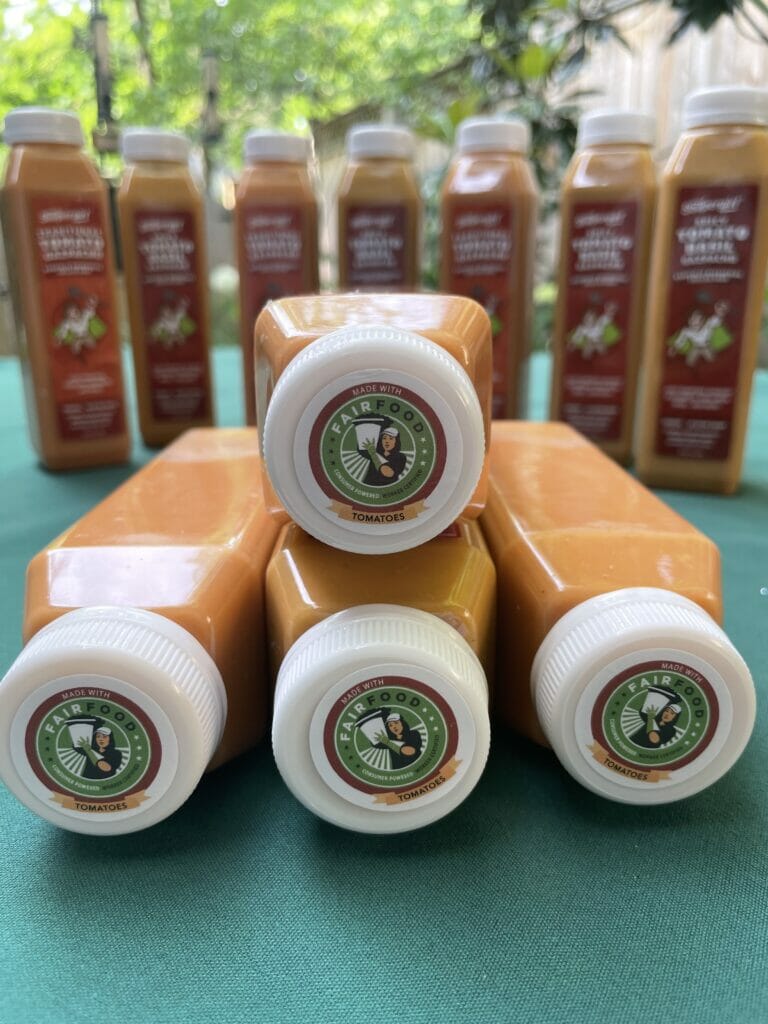After learning about how her own company sourced ingredients, Soupergirl founder Sara Polon realized it was time to change. Now, she wants other companies to join her.

At first glance, the offerings from the Washington, DC-based soup company Soupergirl seem pretty straightforward. The company specializes in vegan and kosher soup and gazpacho, as well as soup toppers that customers can mix and match. There’s the classic tomato soup, a beet gazpacho available in a portable container and even vegan “cheesy” croutons.
Sara Polon founded the company with her mother in 2008, with the goal of making good food and sourcing local ingredients from farms surrounding the DC metro area. From there, the company grew, getting on the shelves at Whole Foods in 2016, followed by Costco, Kroger and other stores across the country. As the company grew, it began looking further afield to source its expanding ingredient needs.
Then, everything changed. In 2020, Polon was faced with new supply issues as a result of the COVID-19 pandemic. As she looked into solving them, she learned more about the food chain from which she sourced her own ingredients and the farmworkers who were suffering under extreme labor conditions. She vowed to change.
Modern Farmer caught up with Polon to talk about her own commitments to sourcing ingredients equitably and why she wants to bring other companies on board as well.
This conversation has been lightly edited for length and clarity.
Modern Farmer: There are a lot of steps to get a vegetable from the field to your bowl of soup. As the purchaser and decision-maker, what do you prioritize?
Sara Polon: You know, we always used to talk about the story of our food. That was one of the phrases we turned to a lot when it came to staying focused as a company. But we were really looking at growing practices, like ensuring things were sustainable, and we hadn’t paid enough attention to humanity, the person who picks those tomatoes.
When I started looking into our supply chain, I was really upset. Because we really tried so hard to implement the best, the safest practices possible here at our facility. But when I looked at our supply chain and I learned about what was going on on the farms, I was appalled. And it kind of changed our trajectory.
If the organic tomato you are eating or cooking with was picked by a farmworker whose wages were stolen, who [was] subjected to abuse and assault, is it really worth the organic certification? I would argue no. We have now been working night and day to clean up our supply chain and get others to pay attention.
MF: Is that when you became affiliated with the Coalition of Immokalee Workers (CIW)?
SP: Yes, and that’s how we became the first consumer packaged good (CPG) brand to get a fair food certification.
The CIW was founded by a group of primarily migrant workers that were just fed up. They were fed up with the abuse, they were fed up with the stolen wages. They organized in church basements, after working full days in the hot Florida sun. And they started striking and highlighted all of the abuse that was going on on these farms.
They started the Fair Food Program, which established basic standards. And you would think that these would be basic norms, such as access to a bathroom and to water and freedom from sexual assault and violence. Most importantly, there was recourse, meaning [that] if there’s a violation, there’s a phone number that farmworkers can call that’s staffed by CIW, and they can enforce these standards.
Once the standards were founded, the CIW then went to retailers. It started with tomatoes and asked retailers such as Whole Foods and Walmart to commit to buying tomatoes from CIW certified farms. Now, 90 percent of the tomato farms in Florida are fair food certified.
MF: But that’s just tomatoes.
SP: Yeah, it’s just tomatoes. And just in Florida. There are 1.3 million farmworkers in this county. How many are on fair food certified farms? Not nearly enough.
I think the issue is that consumers aren’t aware, because when consumers get fired up about something, retailers are forced to act.
MF: You launched in 2008, but when did you learn about your own supply chain?
SP: Right, we launched in 2008, and our original mission was local. We knew a lot of the farmers by name, we sourced really hyper-locally. So, supply chain issues weren’t even a thing for us for the first seven or eight years, because we weren’t big enough.
And then as our business grew, we had to go bigger. I have to be honest, it wasn’t until 2020 [that] I learned more. Because I never dreamed it. Now, I’m a vegan, and I’m very aware of the capacity for cruelty that humans have towards animals and towards each other. But I never dreamed that, in 2022 and 2021, these abuses would be so rampant. And that was very sobering.
MF: How did it feel to be even passively connected to those kinds of violations? For instance, the decision to keep meatpacking plants at full capacity during the early days of COVID or the wage thefts from farmworkers you mentioned?
SP: Crushing. It was crushing, and it made me question why I started this business. We start every management meeting every Friday with the golden rule: Do unto others as you would do to yourself, treat your neighbor as yourself. And I realized that I had failed.
MF: This program is just for tomato farms now. What about onions, carrots, lettuce, any other crop? Are there plans to expand?
SP: We are working on it. And that’s the problem, that’s what keeps me up at night, because we need someone big to demand it. I could demand this change, that farms get fair food certified. But, I mean, a farmer would laugh at me with our current volume. But if we could get Nestle to pay attention or Unilever or Heinz to pay attention? I’m a soup company, and I know that to make good soup, you need good onions. Well, Progresso and Campbell’s, they have to buy this stuff, too.
MF: Retailers are often forced to act when consumers get angry. Individual consumers often care quite a bit about abuses, but they also notice that their grocery bills keep rising. How do you get those people on board and comfortable with paying more for their food?
SP: A lot of the retailers have absorbed the cost; it’s maybe a half a penny more. So, I’m not telling you that your grocery bill is gonna go up by, you know, five dollars, which is a lot of money if you’re a parent feeding a family. I’m talking about maybe two pennies or three pennies. So, that’s been the amazing thing that the CIW has been able to do.
Also, I’ll say that this is not an elitist movement. I’m not telling you that you have to buy certified organic roma tomatoes from Whole Foods, although Whole Foods has been incredible. So is Walmart. So is Trader Joe’s. I am literally just asking you to go to Burger King [which has signed on with the CIW] instead of Wendy’s. This is just focusing on the humans.
MF: Even if the costs jump just half a penny per pound, if you are buying at the kind of volume that Campbells does, that’s a lot. Someone is going to crunch those numbers.
SP: Absolutely. But also, I would counter that every company now has environmental, social and governance (ESG) departments. They have sustainability offices. And they all have budgets. So, you either put your money where your mouths are or you shut down those offices. Because if this office is made aware of modern-day slavery in their supply chain and chooses to ignore it, shame on them.
And look, you and I both know that major corporations are experiencing record profits. And if I can absorb the cost, how can they not? I don’t buy it.
This is also a bigger discussion about the value of food. We really shouldn’t be looking for massive savings when it comes to our food, because the economic pressure trickles down to our farmers and then to the labor. Everyone is struggling now, and I’m not trying to diminish that. But when it comes to food, just remember: When there’s price pressure, it trickles down to the human. And unless you can look that human in the eye and say, ‘Sorry, I need to pay nothing for this product,’ it just doesn’t add up. It’s not a way to build a sustainable society.
MF: For someone else in your position, other CEOs and commercial buyers, what do you propose they do?
SP: The first thing I think someone in my position should do is go to a farm. I was just on a call earlier with another company that’s interested in the cause, and they have been on one of these farms, and we both agreed that they’re not like farms, they’re more like outdoor factories. They’re miles and miles of these huge vines of tomatoes, in the hot blazing sun with no shade. When I went down, I lasted half a day.
People in my position need to see that, to have that connection, because it changes you. You think you know the story of your food until you actually go to the farm that it’s coming from. And then you realize you don’t know squat. Once you have that information, once you meet with these people, you realize it’s really important that we do something because the vulnerability of [farmworkers], it’s crazy. You can just so easily see the opportunities for rampant abuse.
So now, I’m here to make any introductions. I’m having multiple phone calls a week, I’m here to help.
MF: How do you see the issue of farmworkers’ rights playing out as they are compounded by the natural environments of farms?
SP: First, I would ask about when some of the farm regulations were made and when they were updated. Like, if farmworkers have access to water at a reasonable distance, that needs to be looked at.
I remember when San Francisco residents were told they needed to stay inside because ash was raining from the sky. But there were plenty of people that had to leave their homes. When you have people staying home in their air conditioners, you had workers out in the fields picking the strawberries, and there were stories of new moms with their infants strapped to their chest and ash falling from the sky. And you’re gonna tell me that the regulations say that water needs to be a mile away? I don’t want to hear that excuse, because that excuse does not take into account the humanity behind our food.
MF: It sounds like you’re advocating for a multi-faceted approach, where everyone has a role—consumers, farmers, farmworkers and retailers—and it only works well if everyone moves together.
SP: Yeah, and it comes from a groundswell. I think we can all agree that it’s bad to have slavery in our supply chains. And if this is the thing that we can all agree on and we can all take action on and we can all solve, how inspiring would that be? And I might be extraordinarily naive, but all of those actors are going to get into line if the consumers are pissed off.
